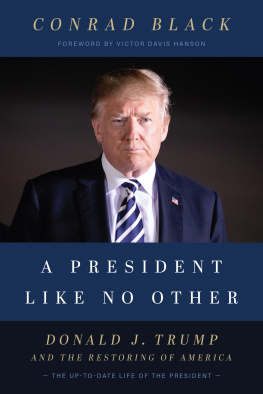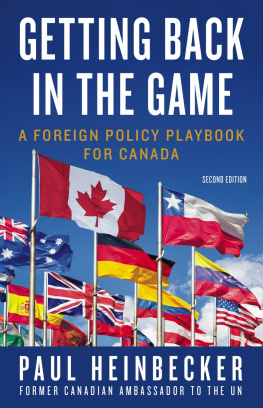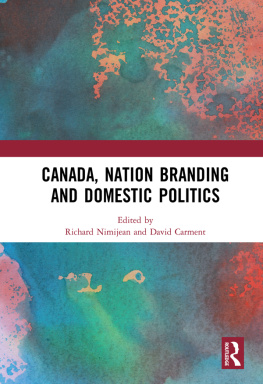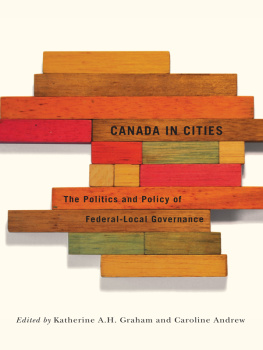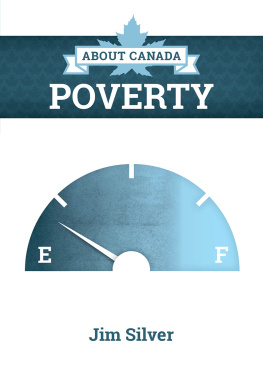THE CANADIAN MANIFESTO
ALSO BY CONRAD BLACK
Rise to Greatness: A History of Canada from the Vikings to the Present
Flight of the Eagle: A Strategic History of the United States
A Matter of Principle
Franklin Delano Roosevelt: Champion of Freedom
THE CANADIAN MANIFESTO
How One Frozen Country Can Save The World
CONRAD BLACK

Sutherland House
416 Moore Ave., Suite 205
Toronto, ON M4G 109
Copyright 2018 by Conrad Black
All rights reserved, including the right to reproduce this book or portions thereof in any form whatsoever. For information on rights and permissions or to request a special discount for bulk purchases, please contact Sutherland House at
Sutherland House and logo are registered trademarks of The Sutherland House Inc.
First hardcover edition, May 2019
If you are interested in inviting one of our authors to a live event or media appearance, please contact for more information about our authors and their schedules.
Manufactured in Canada
Cover designed by Lena Wang
Book composed by Karl Hunt
Library and Archives Canada Cataloguing in Publication
Title: The Canadian manifesto / by Conrad Black
Names: Black, Conrad, author.
Description: Includes bibliographical references.
Identifiers: Canadiana 20190043989 |
ISBN 9781999439552 (hardcover)
Subjects: LCSH: Political planningCanada. |
LCSH: CanadaPolitics and government21st century. |
LCSH: Political planning.
Classification: LCC JL86.P64 B53 2019 |
DDC 320.60971dc23
ISBN 978-1-9994395-5-2
FOREWORD
Jordan Peterson
Canada is the only bicultural, trans-continental, parliamentary confederation that has ever existed, and as it has functioned with relatively minor alterations for 151 years, it is surpassed in seniority of its political institutions, among countries with more than 20 million people, only by the UK and the US.
During much of the time I grew up, the national conversation in Canada, led mostly by the Toronto media elite, centered on the importance of distinguishing ourselves conceptually and politically from that monster of myth-making to our south. It was as if we had to constantly remind ourselves that we were somehow not junior Americans. I think much of this concern has vanished, as our population has grown, as we have fostered three truly great cities (Vancouver, Montreal and Toronto) and some very promising up-and-comers, and as it has become increasingly obvious, for not-so-obvious reasons, that we are self-evidently different from our brothers and sisters in the United States. But we are still unaware of our own great potential. We suffer from a national lack of self-confidence, evident in a true paucity of vision, that drapes itself in the paradoxically self-aggrandizing cloth of humility and a rather dull sense of our own niceness (the least admirable of virtues). We tend toward guilt, as well, and upbraid ourselves constantly for our shortcomingsthe treatment of native Canadians as the country was established, the difficulty mediating between the competing interests of Francophones and Anglophones (and, by extension, the interests of all the other ethnic groups clamouring for a voice), and our inability to make the distribution of wealth equitable at the provincial and, to some degree, individual level. We have paid a price for all this peace-making. It has made us timid.
In his Manifesto, Conrad Black is attempting to change all that. He starts by re-acquainting us with our history. (Or, more accurately, by acquainting us with it: Canadians believe unquestioningly that our peaceful country is dull and has always been that way, although the latter claim is certainly not true. There is no shortage of adventure and mystery in the history of Canada). He points out that we established our country on the basis not so much of multi-culturalism but on the principle of reciprocity (avoiding, as the English did, as Black puts it, imposing their numerical superiority on the French) allied with the provision of a great infrastructurethe uniting railwaythat was of benefit to all concerned. This is a highly effective, understated, and pragmatic approach, uniting amity and productivity, in keeping with the equally understated broader and fundamentally Canadian principles of peace, order and good government. Black details all this in a manner that speaks of fundamental respect and appropriate gratitude for the great achievements of our past, without any descent into the mindless patriotism that merely generates rebellion against its excesses. Those who founded our country were, by and large (and particularly when compared to political operatives in most other places in the world) careful, practical, decent, and possessed of sufficient scope of vision. I would take that over revolutionary fervor and grandiose utopianism any day, despite its comparative lack of drama. And dramathat is best romanticized in history books than lived through by those subject to its privations, uncertainties and horrors.
We stayed stable and prosperous, comparatively, through the most tumultuous century in human history. That is no mean achievement. Thus, the twentieth century, said by Wilfrid Laurier to belong to Canada, did in fact belong to us in important ways, even though more dramatic events took place in louder and more charismatic countries. We established a country of great peace and prosperity and, as well, one that appears to be improving in stature, strength and possibility. We managed that without the great upheavals that mark states out so markedly on the world stage, and that provide them with an oft-dangerous sense of their own manifest destiny. We contributed in no insignificant manner to the defeat of fascism in the 1930s and 1940s and the defeat of communism during the Cold War years (all detailed with admirable brevity in Blacks work). We worked out many of our complex internal contradictions, producing a relatively loose federation that works very well. We are still a country, and even more identifiably so than five decades ago, yet our local institutions retain enough power that local solutions can be generated and tested. With a little vision, perhaps, the 21st century could be more firmly ours, in that our country could be a model for what might constitute the admirable modern state, politically sophisticated, technologically advanced, absent the worship of political leaders that corrupts so may countries (threatening even our great neighbour to the south).
Blacks Manifesto reminds us who we were and, therefore, who we are. In doing so, he lays the groundwork for us to consider who we might yet become. A peaceful nation, capable of mending its own fences, stable and productive for a time worthy of celebration, with an educated, honest and capable population, not so arrogant as to assume a place of primacy in world affairs, not so timid as to presume ourselves incapable of leadership, not least by example; this is perhaps the best that might be hoped for in this world of vulnerability, complexity, and strife. Maybe we can mature in our self-consciousness. Maybe we can take our place provincially, nationally, and on the world stage with increasing but realistic confidence. Maybe we can continue, in our Canadian way, our process of incremental improvement and cautious improvement and prove the victorious tortoise in a race run by too-impetuous hares.
And maybe that could be abetted by a little more vision of precisely the sort that Black manifests in what is, after all, a Manifesto.
A lmost all Canadians, all their conscious lives, are disappointed that Canada is under-recognized in the world. Given the strategic facts of its population, economic influence, and longstanding international relationships, it was never going to happen within anyones lifetime that Canada would emerge as one of the most objectively powerful countries in the world. When Canadian Confederation was approved by the British Parliament in 1867, the broad-minded colonial secretary, Lord Carnarvon, said to the House of Lords that a great nation of the future was being created. Wilfrid Laurier said that the twentieth century belongs to Canada, as that century opened. Both statesmen were correct but optimistic in their timing.
Next page

